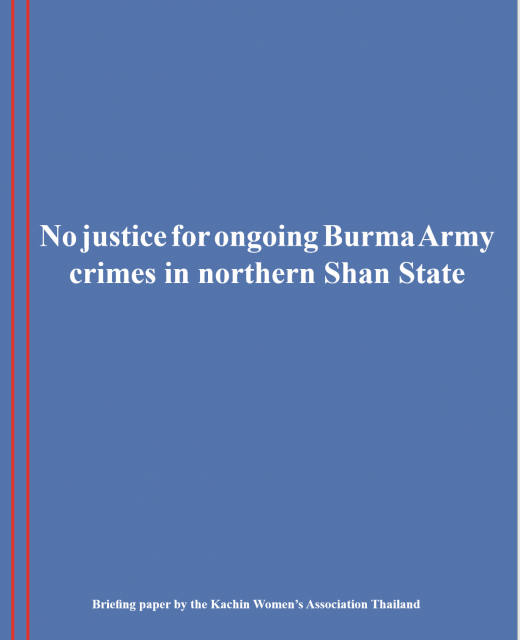No Justice for Ongoing Burma Army Crimes in Northern Shan State

In this briefing paper, KWAT have compiled recent cases of Burma Army torture, killing and shelling of civilian targets from March to August this year in Kutkai township, northern Shan State, where there has been no justice.
In one torture case in August, a 58-year-old deaf mute farmer was arrested in his village and interrogated by troops of Burma Army Infantry Division (ID) 88, who beat him when he could not reply. He was tied up and driven around in an armored tank for two days, before being detained in the Kutkai Infantry Battalion (IB) 45 base for six days.
In the well-publicized case of the shelling of Mawhik quarter of Kutkai town on August 31, 2019, which killed two women and three children, all witnesses testify that the shells were fired from the Burma Army’s IB 45 base, despite there being no fighting in their quarter.
Villagers have been too scared of the military to complain or press charges. In only one case has the Burma Army gone through the motions of an investigation: the murder of 51-year-old Nang Htang on the night of July 3, 2019 – where all evidence points to soldiers of IB 261 who had arrived that day in her village. However, the military has blocked police involvement and sought to protect its own personnel.
This is ominously reminiscent of the rape-murder case of two Kachin teachers in northern Shan State on the night of January 19, 2015, where evidence pointed clearly to troops of Burma Army LIB 503 who had just arrived in their village, but where justice remains elusive until today. Medical staff were threatened by the military not to release evidence from the post mortem examination, and the army commander-in-chief himself publicly threatened to sue anyone accusing the military of involvement. Until today, there has been complete impunity for this horrific crime, where the teachers were not only raped and killed, but also brutally tortured and mutilated.
Clearly, justice is not being served under Burma’s military justice system. At the same time, fear of the military is preventing the civilian legal system from functioning. Lawyers are afraid to take up cases against the military, and in the rare instances they do, the cases are dismissed: such as the case of 28-year-old Sumlut Roi Ja — abducted, sexually assaulted and killed by the Burma Army in October 2011 – which was dismissed by the Supreme Court for “lack of evidence.”
Continued Burma Army aggression and expansion in the ethnic areas, and their prevailing power under the 2008 constitution, are the key challenges to justice in Burma.
Download full briefer in English.
Download full briefer in Burmese.
၎
င
၎
၎

